Real Estate Blogging Basics: Using Other People’s Content Without Getting Sued
Real estate blogging is a great way to build trust and get leads but it can also get you in a lot of trouble if you don't give credit where credit is due
Real Estate blogging can yield major results for your team. It’s an easy and effective way to establish credibility with your audience and build trust and lasting relationships with your network.
If you’re not careful though, your blog can also damage your reputation and ability to get leads if you don’t give credit where credit is due. Even worse, it can lead to costly mistakes for your business.
The subject of blogging etiquette has come up a lot recently in our community. One member of our Beat Zillow group on Facebook even created this poll for other agent’s to weigh in on the topic.
Take a look at the results.
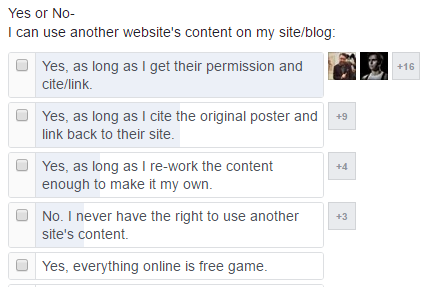
What answer would you choose?
Today we’re going to clear up any muddy waters surrounding real estate blogging attribution, copyright and how to correctly cite sources. This will ultimately give you more freedom and confidence when blogging and ensure that you don’t end up in any sticky legal situations.
Let’s dive in!
In order to avoid stealing people’s content, you’ve got to know what to look out for. There are several factors at play when it comes to copyright infringement. So let’s first start by getting better acquainted with the territory.
What does copyright actually mean?
According to Copyright.gov, (see what I did there?) “Copyright literally means the right to copy but has come to mean that body of exclusive rights granted by law to copyright owners for protection of their work. Copyright protection does not extend to any idea, procedure, process, system, title, principle, or discovery. Similarly, names, titles, short phrases, slogans, familiar symbols, mere variations of typographic ornamentation, lettering, coloring, and listings of contents or ingredients are not subject to copyright.”
Essentially, copyright law is applied to anything that you curate that is tangible. When it comes to blogging, the text you write and publish is covered.

Intellectual property is protected by law in the form of patents, trademarks as well as copyright law when it applies.
A trademark is used to cover branding and identity. Like a logo. You can trademark your blog as well.
Patents protect inventions.
In general, when we talk about copyright violations in real estate blogging, it’s usually going to be in regards to graphics and images. And you’d better believe that photographers and companies that publish stock photos will come after you if you use one of their images without permission or the proper licensing.
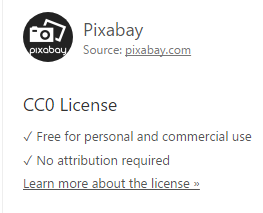
Unless you’re using a paid-service like BigStock to ensure your images are royalty free, you should always get online photos from a site that curates content that is free for personal and commercial use.
The above details are from Pexels.com. This is an excellent site with a variety of photos you can safely use. Plus, they include all of the licensing details on the same page as the image. We’ve rounded up a few other websites that provide free stock photos HERE.
CC0 License – if you find an image under this Creative Commons licensing, you’re in the clear. CC0 essentially means no rights reserved and does not require attribution.
Knowing the source of your images is just as important as knowing who and what you’re citing for information.
For example, just because you find an image or infographic on Pinterest or Twitter doesn’t mean it’s fair use or that you can simply attribute it to either of these social networks. The original photographer or author still retains ownership. And this is why stock photo sites are always a safe, painless bet.
If you and your team are struggling to find the perfect images, give Bigstock a try. Click THIS LINK to try it free for a week and see what you think.
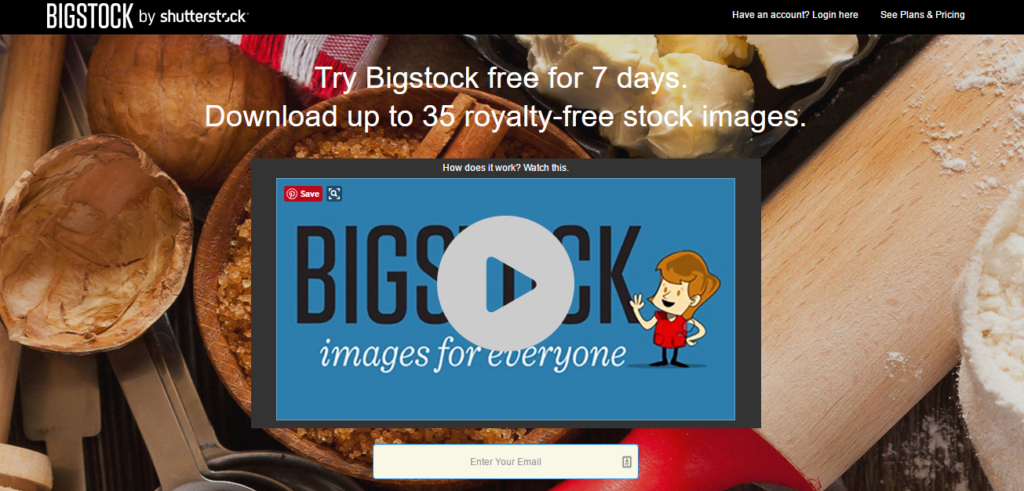
Gone are the college days of APA and MLA format. There’s no one style guide for real estate blogging. We’re venturing more into internet etiquette for the most part.
Notice the most popular option in the Beat Zillow poll was to only share content from another website if the blogger has explicit permission.
Take a look at this comment from LeadSite pro Karin Carr.

While it may be doable to get prior consent when working within your own community and with other experts you know, it’s not very realistic in many cases.
What if you want to pull a stat from WordStream or share a passage from a New York Time’s interview.
Who do you contact? What if they don’t respond? Should you just not include any sources?
What’s the alternative?
Karin’s right on this one.
Sharing around great information and using reliable sources in your blogs can only help your content marketing.
Here’s a three-step checklist you can use to ensure you’re giving people proper credit.
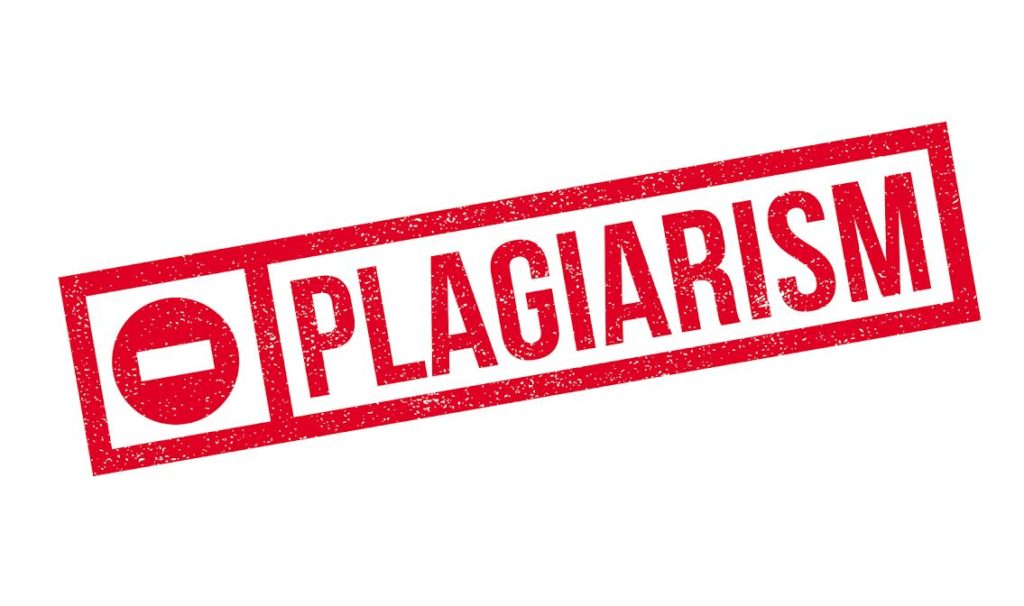 1. Cite Your Source
1. Cite Your SourceIt goes without saying, at least it should, that you should never copy and paste someone else’s work onto your blog. But that doesn’t mean you can’t use information from other places as long as you are transparent about where you got your data or content from.
If you’re going to quote someone or a website, you need to attribute the source. Use these starter sentences for easy, on point citations:
According to (SOURCE),
As stated in (SOURCE),
A recent study from (SOURCE),
SOURCE said an interview with (SECOND SOURCE),
Today we learned from (SOURCE)
Citing your source is only the first part. To complete the citation, you need to having this information hyperlinked back to the source. This way, your readers can access the original article or interview.
It’s not always as easy to do this with photos, so that’s we why suggest using a worry-free stock photo site.
Inserting a link to credit your source serves two very important purposes.
First, you’ve done your part to credit your source. This allows your readers to look deeper into the subject if they’d like. The cool part is that you’re the one giving them access to this educational content.
This can only help to earn their trust, and even their business down the road, when they see that you’re providing great resources even beyond your own original content.
Secondly, you’re also driving more traffic to the source site which can open all sorts of potential collaborations in the future. Especially for cross-promoting on social media and opportunities for guest blogging. Or even inspiring a website to feature you, your team, or your blog!
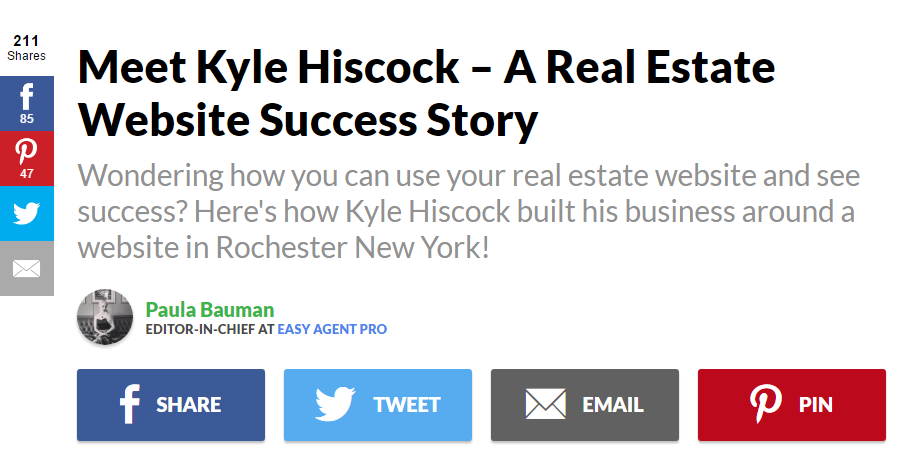
The one case that this two-step attribution won’t work is if you pull in someone’s entire blog or article. And you should never do this. Because now you’re not encouraging your audience to check out the original content. You’re just being lazy and ripping off the author.
You can also ask yourself if it seems likely that any blogger would give you permission to repost an entire piece of original content. Most likely, they would not.
Lastly, don’t take credit for other people’s ideas. One way to do this is, of course, not to steal content, but taking a casestudy or video idea from someone and not crediting them as a source of inspiration, is just a crappy thing to do.
You like being recognized for your contributions, right? So make sure you give folks credit for their ideas and efforts as well.
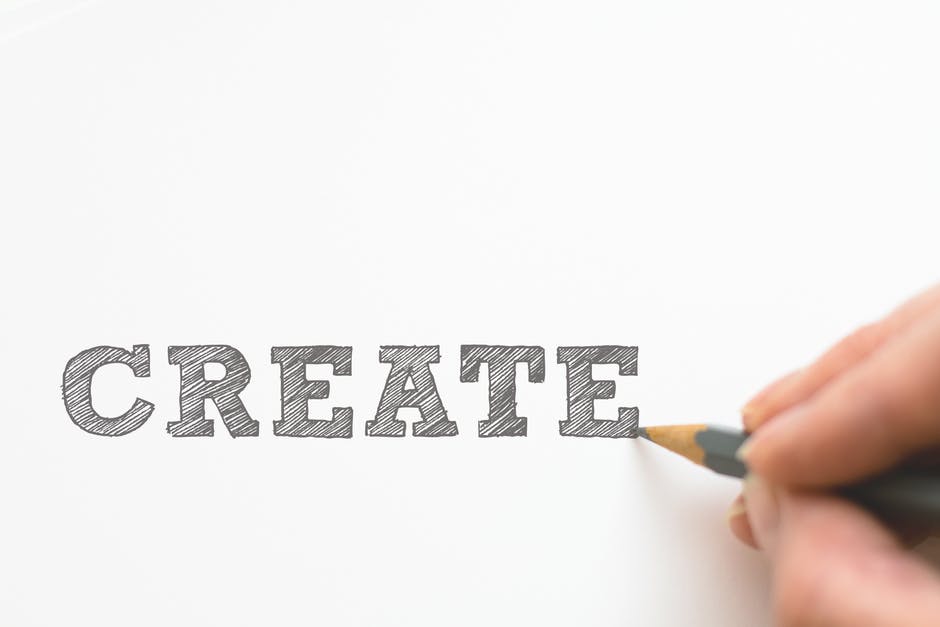
We hope that clears up some of your questions!
What else do you want to know about copyright and real estate blogging etiquette?
Tell us in the comment section!
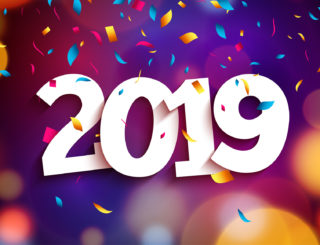
What’s your 2019 real estate marketing plan? The end of the year is creeping up on us and with it comes the inevitable look-back on your real estate business. How’d you do? If you didn’t get the results you were aiming for, your year-end business planning may require an overhaul of your real estate marketing plan. Yeah, it’s boring stuff, but critical to your success in 2019. Even if you slap together the basics of a real estate marketing plan, you’ll be a step ahead of most agents in your market. Your 2019 real estate marketing plan takes money It...
November 29, 2018

Want free real estate leads from Facebook? You can find them with a tool that's so obvious you'll wonder why you didn't think of it sooner.
March 1, 2017

Hey rookie, have you figured out yet that there’s a whole lot of stuff you didn’t learn in real estate school? The practical, day-to-day-how-to-run-your-biz kind of stuff? Like how to build a real estate vendor referral program? All that money, all that time, all that stress and you still really don’t have a clue about what you’re supposed to do daily. We got you up to speed on what you’ll need tech-wise, and today we’ll show you how to build your vendor network. The list is long, but we’ve prioritized it to make it easier for you to get started....
June 7, 2018
Let’s boost your lead gen.

Connect your local MLS to Facebook to promote all properties in your MLS or create any specific niche catalog of listing you want to sell using dynamic Facebook ads. Here are just some of the ways you can use these new types of ads to stand apart from the competition: